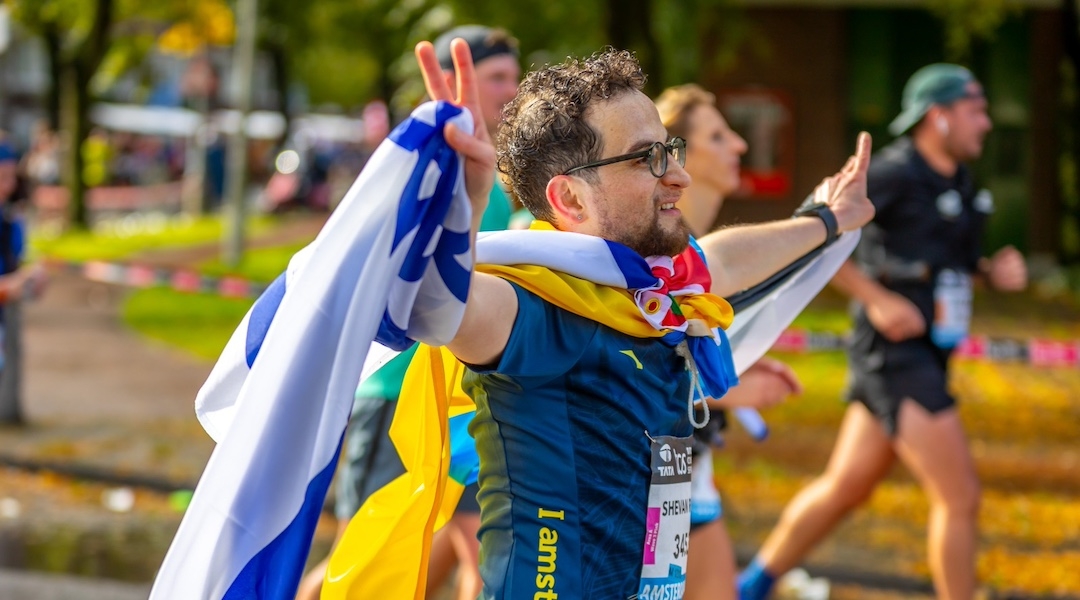A proud Syrian Jew fled to Amsterdam to escape abuse. Since Oct. 7, he’s been afraid to sleep in his own apartment.
Jews in the Netherlands have been hiding their Jewishness to avoid violent threats tied to the Israel-Hamas war

Syrian immigrant Shevan ran the Amsterdam Marathon with Israeli, Palestinian and Ukrainian flags. (Courtesy of Shevan)
(JTA) — When Shevan arrived in the Netherlands as a refugee of the Syrian Civil War, he picked up running. The habit helped him combat traumatic memories from his home country, where he was arrested for participating in peaceful demonstrations against the Assad regime in 2011.
During six months in prison, Shevan says he was tortured, raped and abused. He fled to Lebanon after his release and registered with the United Nations High Commissioner for Refugees, which allowed him to resettle in the Netherlands in 2013. Now 33 years old, the gay, Jewish Syrian works as an activist for LGBTQ causes and human rights.
He planned to run the Amsterdam Marathon this year with a Ukrainian flag, showing his solidarity with the country that has suffered thousands of casualties since Russia’s invasion that began in February 2022. Then a week before the marathon, war erupted between Israel and Hamas.
So Shevan carried three flags during the race on Oct. 15. He added an Israeli flag to honor the 1,400 Israelis killed and over 200 taken hostage by Hamas. And he ran with a Palestinian flag to support civilians in the Gaza Strip, whose health ministry has reported over 8,000 people killed by Israeli airstrikes amid a desperate humanitarian crisis.
Shevan hoped that running 26 miles with three flags on his back would promote his belief in peace and security for all people, from the Middle East to Europe. But three days after the marathon, he found a red swastika and Star of David painted across the window of his ground-floor apartment in Utrecht.
“I ran for peace,” said Shevan, who asked the Jewish Telegraphic Agency not to use his last name for fear of further retaliation. “What more should I do? I ran, for God’s sake, with three flags. This situation has just pushed me to be crazy.”
Shevan said he has been targeted as a Jew in the Netherlands well before this year’s Israel-Hamas war, too. Last year, he found his front door covered in swastikas, Stars of David and the word “Juden.” In 2021, while wearing a kippah on the train, he was assaulted by a Dutch man who called him a “dirty Jew” and other antisemitic curses. Over the years he has filed multiple reports with the police, but they have never made an arrest.
Since Oct. 7, Shevan has been extra careful. He no longer wears a kippah in public and he removed the mezuzah and the sign reading “Shalom” in Hebrew and English from his front door. After the attack on his window, he stopped sleeping in his own home. He uses his apartment during the day and stays with friends overnight.
“What I face right now, of course it’s not like Syria,” he said. “But I would like once in my life to have justice. I don’t want anyone to call me ‘dirty Jew,’ or ‘dirty gay,’ or ‘dirty whatever.’ I just would like to live in peace.”
Dutch Jews often report a ripple of backlash when there is fighting in Israel, according to Naomi Mestrum, director of the Center for Information and Documentation Israel (CIDI), a group that tracks antisemitism in the Netherlands.
Only about 30,000 Jews live in the Netherlands. The community was decimated by the Holocaust, when roughly 100,000 were killed in death camps. Today, many Dutch people lack education on their own country’s Jewish history; earlier this year, a Claims Conference survey reported that a majority of Dutch residents did not know the Holocaust took place there.

A view of the recent vandalism on Shevan’s window. (Courtesy)
The lack of familiarity and knowledge about Jews can inflame prejudice, said Mestrum. It can also aggravate the conflation of Jewish people in the Netherlands with the actions of the Israeli government.
“The community is very small, and that means that most people in the Netherlands might have never even met a Jew,” she told JTA. “It makes them like strange creatures that are far away — it’s the unknown.”
Like other parts of Europe and the United States, the Netherlands has seen public fury boil over Israel’s bombardment of Gaza and the enclave’s ensuing humanitarian crisis. Thousands of Dutch protestors have demanded a ceasefire and increased aid in Gaza, including some activists who occupied the entry to the International Criminal Court in The Hague last week.
Shevan sympathizes with voices calling for peace. He has visited Israel and met both Israelis and Palestinians who advocate for a peaceful resolution to the decades-old conflict, including the Canadian-Israeli peace activist Vivian Silver, who was abducted by Hamas on Oct. 7. But he was appalled when a Dutch neighbor, apparently outraged at the Israeli government, turned her sights toward him.
“When the war started between Israel and Hamas, I was in the supermarket and she asked me, ‘How many Palestinians did your people kill today?’” he said. “What kind of a question is this, for God’s sake? How many Palestinians did my people kill today — my people? What do you mean by my people?”
Esther Voet is the editor-in-chief of the Nieuw Israelietisch Weekblad, known in English as the Dutch Jewish Weekly. It is the oldest news magazine in the Netherlands — operating since 1865 — and the country’s only Jewish weekly, boasting a readership between 20,000 and 25,000 in a country of only 30,000 Jews.
After Hamas’ Oct, 7 attacks, Voet said her staff was inundated with calls. Many subscribers pleaded for a change in the delivery procedure: They did not want their magazines to arrive in its usual transparent plastic cover. If the magazine did not change its packaging, some readers said they would cancel their subscriptions.
“We decided to put it in a white anonymous envelope, so that their neighbors do not know they are Jewish,” Voet told JTA.

A recent cover of the Nieuw Israelietisch Weekblad reads “We are one.” (Courtesy of Esther Voet)
At CIDI, Mestrum has also been overwhelmed with calls from tense Jewish families.
“We are getting a lot of phone calls from parents that are worried about their kids going to school,” she said. “We have incidents of kids getting very nasty comments, praising Hitler or praising Hamas for finishing Hitler’s job.”
On Oct. 13, Amsterdam’s three Jewish schools closed as a precautionary measure, following a former Hamas leader’s call for street protests across the Muslim world that day. Some of the city’s synagogues have reported a rise in threats over recent weeks.
Chanan Hertzberger, chairman of the Central Jewish Board of the Netherlands, told JTA that his organization has pushed for increased security around the country’s synagogues and Jewish schools. Authorities in several Dutch cities were quick to shore up their protection around Jewish institutions after Hamas’ attacks, and Prime Minister Mark Rutte said his government has been “extra alert” to the issue.
But many members of the Jewish community are still fearful, said Hertzberger. And as they see antisemitism flaring in their backyard, many can no longer view Israel as a safe refuge.
“The community got a big blow,” he said. “We always regarded Israel as the place where we can always go, no matter what happens.”
This article originally appeared on JTA.org.
A message from our Publisher & CEO Rachel Fishman Feddersen

I hope you appreciated this article. Before you go, I’d like to ask you to please support the Forward’s award-winning, nonprofit journalism so that we can be prepared for whatever news 2025 brings.
At a time when other newsrooms are closing or cutting back, the Forward has removed its paywall and invested additional resources to report on the ground from Israel and around the U.S. on the impact of the war, rising antisemitism and polarized discourse.
Readers like you make it all possible. Support our work by becoming a Forward Member and connect with our journalism and your community.
— Rachel Fishman Feddersen, Publisher and CEO



























